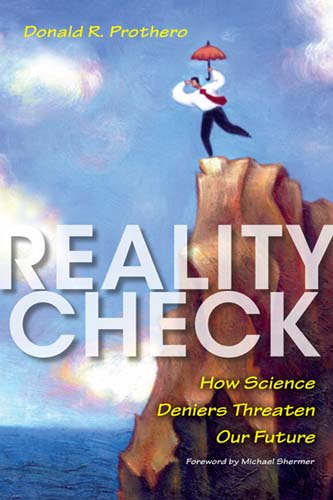I ’m in the process of rereading Donald R. Prothero’s Reality Check: How Science Deniers Threaten Our Future, in preparation of writing a review of it. It’s a fantastic book. Unfortunately, “it’s a fantastic book” is four words long, leaving me the task of finding a further 1996 words to say about it. But my motto is: when in doubt, nitpick.
’m in the process of rereading Donald R. Prothero’s Reality Check: How Science Deniers Threaten Our Future, in preparation of writing a review of it. It’s a fantastic book. Unfortunately, “it’s a fantastic book” is four words long, leaving me the task of finding a further 1996 words to say about it. But my motto is: when in doubt, nitpick.
Here’s a point that I want to nitpick now. In the chapter on evolution, Prothero writes, “If ever there was an idea established within the realm of science, it is the fact that life has evolved. The evidence is so overwhelming that it is accepted by virtually all scientists (especially those who have any training or exposure in the topic).”
No argument so far. The problem comes later in the paragraph, where Prothero offers two sources. “In 1987,” he observes, “Newsweek found that less than 0.15% of 480,000 biologists and earth scientists polled doubted evolution.” The citation is to a June 29, 1987, story by Larry Martz with Ann McDaniel.
What Martz and McDaniel actually wrote, though, was, “By one count there are some 700 scientists with respectable academic credentials (out of a total of 480,000 U.S. earth and life scientist[s]) who give credence to creation-science, the general theory that complex life forms did not evolve but appeared ‘abruptly.’”
The gloss on “creation-science” is interesting, by the way; it reflects the shift from the specific definition of creation science embodied in the 1981 Arkansas equal time law to the generic definition embodied in the 1981 Louisiana equal time law, which was ruled unconstitutional by the Supreme Court shortly before the Newsweek article appeared.
Anyhow, note that Newsweek’s count is of scientists who “give credence to creation-science,” not of scientists who “doubt evolution.” Probably anyone who accepts creation science doubts evolution (at least in the sense of common ancestry), but the converse isn’t true. So 0.15% would only be a lower bound on the number of doubters of evolution.
Worse, despite Prothero’s use of the verb “polled,” there’s no mention of a poll in the story, only of a count, whatever that is. So where did the numbers come from? Well, it’s a little late in the day to try to check with Martz and McDaniel. But frankly, the 480,000 figure sounds high, and the 700 figure sounds low.
According to a report (PDF) based on the U.S. Census for 1980—hey, trivia fans: the Discovery Institute’s founder Bruce Chapman headed the census bureau then!—there were only about 314,000 natural scientists in the country in total, with about 46,000 geologists and geodesists and about 46,000 biological and life scientists tallied.
(Postscript: My colleague Josh Rosenau discovered a 1993 report (PDF) from the National Science Foundation according to which there were 497,400 people with doctoral degrees in the sciences in the U.S. then. That’s close enough to 480,000 to be suggestive. But not all of them were in the life sciences or the earth sciences.)
As for 700, I speculate that it was chosen as the number of members of the Creation Research Society, which requires its voting members to have earned a “postgraduate degree in a recognized area of science.” Its membership hovers around 700, according to the arch-creationist Henry M. Morris’s The Long War Against God (1989).
So rather than 700/480,000 = ~0.15%, 700/92,000 = ~0.75% would have been a better estimate of the prevalence of creation scientists in the U.S. life sciences and earth sciences communities circa 1987. And it would have been only a lower bound, because not all scientists who accepted creation science would have been members of the Creation Research Society.
Whew! Fortunately, Prothero’s second source is quicker to deal with. “Another study,” he writes, “found that 99.9% of biologists agreed that evolution has occurred.” He cites a 2006 article in a newsletter of the National Institutes of Health, reporting on a four-part lecture series on evolution in medicine held at the NIH.
In the article, Brian Alters—a professor of science education then at McGill University, now at Chapman University, and then a member, now president, of NCSE’s board of directors—is quoted as saying, “While 99.9 percent of scientists accept evolution, 40 to 50 percent of college students do not accept evolution and believe it to be ‘just’ a theory.”
So I asked Alters about the quotation attributed to him. Seven years later, he doesn’t remember saying it, but he agrees that there was no “study” with that finding; the 99.9% figure, if he offered it, was just a rhetorical flourish, a colorful way of expressing the undoubted platitude that the vast majority of scientists accept evolution.
And it is indeed a platitude; Prothero wasn’t wrong. But he would have done better to find a better source. In 2009, a survey conducted by the Pew Research Center for the People & the Press found that “[n]early all scientists (97%) say humans and other living things have evolved over time.” There. Was that so hard?

